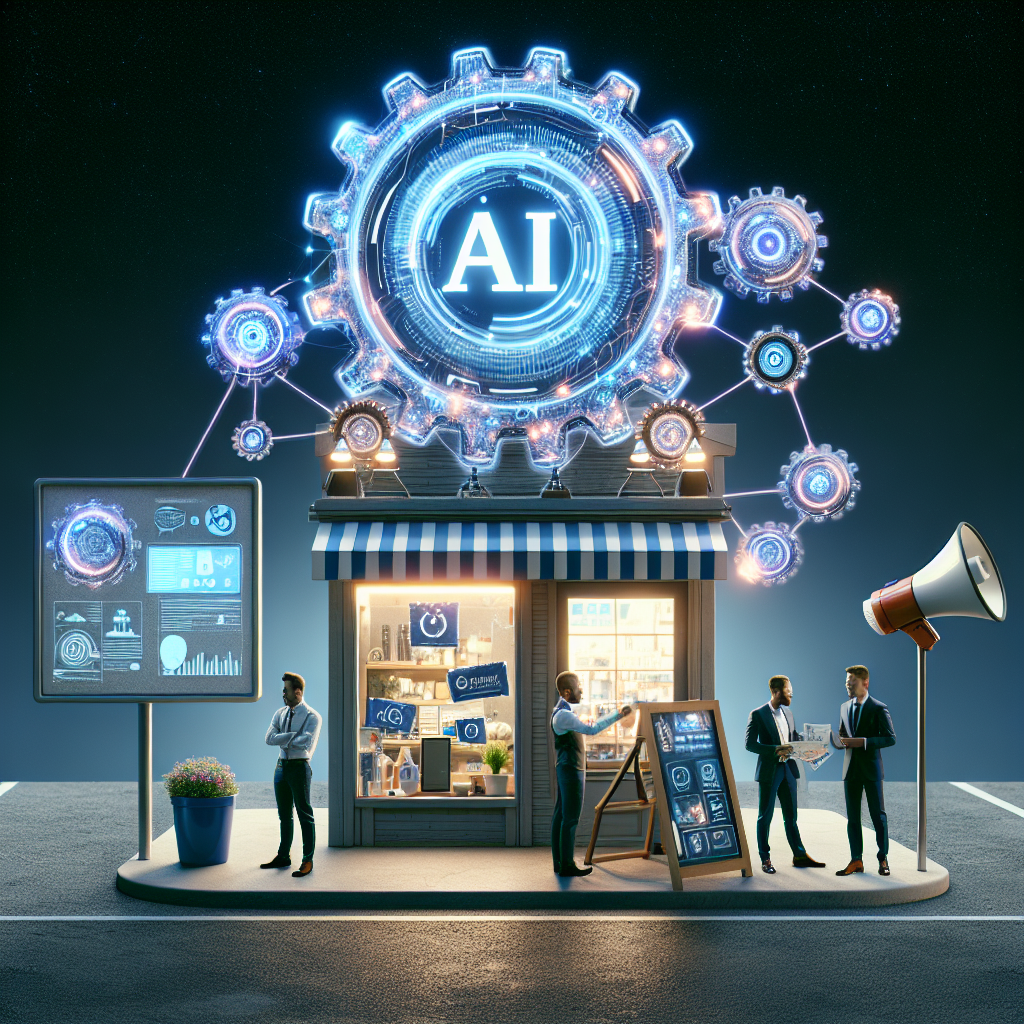Are you a small business owner looking to up your marketing game? Well, look no further! In this article, we will explore the incredible benefits of using AI (Artificial Intelligence) for small business marketing. AI has revolutionized the way businesses operate, and its impact on marketing strategies cannot be underestimated. From streamlining customer targeting to optimizing campaign performance, AI offers endless possibilities for small business owners to boost their marketing efforts and stay ahead of the competition. So, get ready to discover how AI can take your marketing game to the next level and propel your business towards success.
Increased Efficiency in Marketing Strategies
Automated Data Analysis
AI technology provides small businesses with the ability to automate data analysis, saving valuable time and resources. By leveraging machine learning algorithms, businesses can analyze large volumes of data quickly and accurately, identifying valuable insights and trends. This allows you to make data-driven decisions and optimize your marketing strategies effectively.
Improved Personalization
Personalization is key to successful marketing campaigns, and AI can play a significant role in enhancing this aspect. With AI-powered tools, you can collect and analyze customer data, such as browsing behavior and purchase history, to tailor personalized marketing messages and offers. By delivering personalized content to your target audience, you can effectively engage with customers and build stronger relationships.
Enhanced Customer Segmentation
AI technology allows for more accurate and granular customer segmentation. By analyzing various customer attributes and behaviors, you can identify distinct segments within your target market. This enables you to create targeted marketing campaigns that resonate with each segment, increasing the likelihood of conversion and customer satisfaction.
Cost Savings
Reduced Need for Manual Labor
Implementing AI in your marketing strategies can significantly reduce the need for manual labor. Tasks that were traditionally performed manually, such as data analysis and content creation, can now be automated with AI tools, saving you time, money, and resources. This allows your marketing team to focus on more strategic activities that require human expertise and creativity.
Elimination of Redundant Tasks
AI technology can eliminate redundant tasks in your marketing process, streamlining your operations and improving efficiency. For example, AI-powered tools can automatically schedule and distribute social media posts, eliminating the need for manual posting. This not only saves time but also ensures consistent and timely content delivery across multiple platforms.
Optimized Ad Spending
AI-powered tools can analyze vast amounts of data to optimize your ad spending. By automatically monitoring campaign performance and audience response, AI can identify which ad placements and targeting parameters are generating the highest return on investment (ROI). This enables you to allocate your marketing budget more effectively and maximize the impact of your advertising efforts.

Improved Customer Experience
Real-time Interaction
AI technology allows for real-time interaction with your customers, enhancing their overall experience. Chatbots, for example, can provide instant support and answer frequently asked questions, ensuring that customers receive timely assistance even outside regular business hours. This level of responsiveness can significantly improve customer satisfaction and loyalty.
Intelligent Chatbots
Intelligent chatbots powered by AI can simulate human-like conversations and provide personalized recommendations. By analyzing customer data and understanding their preferences, chatbots can suggest relevant products or services, offer tailored solutions to their queries, and even assist with purchase decisions. This personalized approach enhances the customer experience and increases the likelihood of conversion.
Customized Recommendations
AI algorithms can analyze customer data to generate customized recommendations based on individual preferences and purchase history. By leveraging this technology, you can provide personalized product recommendations to your customers, increasing cross-selling and upselling opportunities. This not only enhances the customer experience but also drives higher customer engagement and sales.
Effective Targeting and Lead Generation
Advanced Audience Profiling
AI enables advanced audience profiling, allowing you to understand your target market better. By analyzing various customer attributes and behaviors, AI algorithms can identify patterns and characteristics that define your ideal customers. This knowledge enables you to develop more accurate buyer personas and tailor your marketing efforts to reach the right audience.
Precise Ad Targeting
AI-powered tools can optimize ad targeting by analyzing customer data and predicting their preferences. By understanding the specific needs and interests of your target audience, you can deliver highly relevant ads that resonate with them. This precision targeting increases the likelihood of engagement and conversion, maximizing the effectiveness of your advertising campaigns.
Automated Lead Scoring
AI technology can automate the process of lead scoring, allowing you to prioritize and focus on the most promising leads. By analyzing customer data, AI algorithms can assign scores to leads based on factors such as their engagement level, purchase intent, and demographic information. This automated process saves time and ensures that your sales team is pursuing leads with the highest potential for conversion.

Data-driven Decision Making
Accurate Performance Analytics
AI technology provides accurate performance analytics, allowing you to evaluate the success of your marketing campaigns with precision. By analyzing various metrics, such as click-through rates, conversion rates, and customer engagement, AI algorithms can provide valuable insights into campaign effectiveness. This data-driven approach enables you to make informed decisions, optimize your strategies, and allocate resources wisely.
Predictive Analytics for Campaigns
AI-powered predictive analytics can forecast the outcomes of your marketing campaigns based on historical data and customer behavior patterns. By leveraging this technology, you can anticipate future trends, identify potential challenges, and make necessary adjustments to maximize campaign success. Predictive analytics also helps you allocate your resources effectively, saving time and money.
Improved Marketing ROI
By leveraging AI technology in your marketing strategies, you can improve your return on investment. AI-powered tools can analyze various data points, such as customer behavior and campaign performance, to optimize your strategies and allocate resources effectively. This data-driven approach ensures that your marketing efforts are focused on activities that generate the highest ROI, maximizing your overall marketing success.
Enhanced Content Creation
Automated Content Generation
AI technology can automate the process of content generation, saving you time and resources. With AI-powered tools, you can create blog posts, social media content, and even product descriptions automatically. These tools use natural language processing to generate high-quality, engaging content that resonates with your target audience. This automation enables you to produce content at scale without compromising on quality.
Optimized SEO Strategies
AI-powered SEO tools can help you optimize your website’s content for search engines. These tools analyze search patterns, competitor data, and user behavior to identify keywords and strategies that can improve your website’s visibility and ranking. By leveraging AI in your SEO efforts, you can attract more organic traffic to your website and increase your chances of reaching potential customers.
Dynamic Ad Campaigns
AI-powered tools enable the creation of dynamic ad campaigns that adapt to customer behavior and preferences. By analyzing real-time data, such as browsing history and purchase behavior, AI algorithms can generate and display personalized ads to individual customers. This dynamic approach increases the relevance and effectiveness of your ads, driving higher engagement and conversion rates.

Streamlined Social Media Management
Automated Post Scheduling
AI-powered social media management tools can automate the process of post scheduling, saving you time and effort. These tools analyze audience behavior patterns, optimal posting times, and engagement metrics to determine the best times to post content on different platforms. This automation ensures that your posts reach your target audience when they are most active, maximizing visibility and engagement.
Social Listening and Sentiment Analysis
AI technology enables social listening and sentiment analysis, allowing you to monitor and analyze online conversations about your brand. By analyzing social media posts, comments, and reviews, AI algorithms can identify customer sentiment, uncover insights, and address potential issues promptly. This proactive approach to social media management helps you build a positive brand reputation and engage with your customers effectively.
Efficient Community Management
AI-powered tools can streamline community management on social media platforms. These tools can analyze and categorize user comments, identify frequently asked questions, and automatically provide responses or route inquiries to the appropriate team members. This automation saves time and ensures that your community management efforts are efficient and effective, fostering positive customer experiences.
Improved Email Marketing Campaigns
Personalized Email Automation
AI-powered email marketing tools can automate the process of personalized email campaigns. By analyzing customer data and behavioral patterns, these tools can send targeted emails with personalized content, recommendations, and offers. This level of personalization increases customer engagement and conversion rates, resulting in more effective email marketing campaigns.
Behavioral Triggers
AI technology allows for the implementation of behavioral triggers in your email marketing campaigns. By tracking customer actions, such as website visits and purchase history, AI algorithms can trigger specific email communications based on individual behavior. Whether it’s a follow-up email after an abandoned cart or a personalized discount offer for a loyal customer, behavioral triggers enhance the relevance and effectiveness of your email marketing efforts.
Automated A/B Testing
AI-powered tools can automate A/B testing, allowing you to test different variations of your email campaigns and identify the most effective strategies. These tools analyze customer responses, such as open rates and click-through rates, to determine which email version performs better. By automating the testing process, AI saves you time and ensures that your email campaigns are optimized for maximum results.

Competitor Analysis and Market Research
Automated Competitor Monitoring
AI technology can automate the process of competitor monitoring, providing you with valuable insights into your competitors’ strategies and initiatives. AI-powered tools can track competitor social media activities, website changes, and product launches, allowing you to stay informed and adapt your marketing strategies accordingly. This automation saves time and ensures that you are always aware of your competitive landscape.
Trend Analysis
AI algorithms can analyze large amounts of data to identify emerging trends and patterns in your industry. By monitoring social media conversations, customer behavior, and industry news, AI-powered tools can provide you with real-time insights into the latest trends shaping your market. This knowledge enables you to adjust your marketing strategies proactively, staying ahead of the curve and capturing new opportunities.
Identifying New Opportunities
With AI technology, you can identify new market opportunities by analyzing customer data and market trends. AI-powered tools can pinpoint gaps in the market, unfulfilled customer needs, and emerging customer segments. By leveraging this knowledge, you can tailor your marketing efforts to target these untapped opportunities, gaining a competitive edge and driving business growth.
Mitigation of Human Errors
Minimized Mistakes in Data Entry
AI technology eliminates the risk of human errors in data entry and management. By automating data collection and analysis processes, AI-powered tools ensure the accuracy and consistency of the data. This reduces the chances of errors that could impact marketing decisions and campaign performance, allowing you to make informed choices based on reliable information.
Elimination of Human Bias
AI algorithms are not influenced by human bias, allowing for impartial decision-making. By relying on AI tools for tasks such as ad targeting and customer segmentation, you can ensure that your marketing strategies are based on objective data rather than subjective opinions. This reduces the chances of bias affecting your campaigns, promoting fairness and maximizing results.
Reduction in Manual Oversight
AI technology reduces the need for manual oversight of marketing processes. By automating tasks such as campaign monitoring, data analysis, and lead scoring, AI-powered tools can function independently, providing you with accurate insights and recommendations. This reduction in manual oversight frees up time for your marketing team to focus on high-value activities, such as strategy development and creative endeavors.


